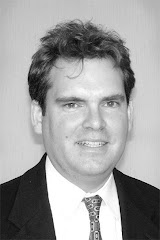Like former White House press secretaries.
But now we have Scott McClellan, 40, White House press secretary from 2003 to 2006 writing something of a tell-all book on the administration during the sale of the Iraq war and the post-Katrina blundering.

I have much trouble with former political staffers writing dishy books after having the privilege of serving behind the curtains of power. It’s the job of the press to get back there and reveal the warts — not well-paid Benedict Arnolds who jump from what should be high-minded public service to the low road of celebrity cable TV commentator.
For a year and a half in the mid-1990s I served as the Washington, D.C.-based communications director for U.S. Rep. Pat Danner, D-Mo.
For most of my tenure she was a two-term congresswoman. As a result of this lack of seniority our office had limited power, although we did speak in Congress for a wide swath of Missouri, and her membership in the conservative Democrat Blue Dog organization, which would swing over on some GOP initiatives, gave us more influence than most two-termers.
When you have the privilege of serving in this capacity, of being in the office when speeches are written, votes are determined and arguments aired, part of the deal is that, upon leaving, for good, bad or indifferent reasons, you go on your way. You don’t rip your former boss in a book or magazine article. I didn’t run over to the Kansas City Star and offer to write a piece for one of its Sunday sections when I left Danner’s employ. She taught me a lot about politics. End of story.

If political leaders suspect they are going to get McClellaned, they will put more of a premium on loyalty than robust thinking. They will isolate themselves even more, and the nation will be worse for it. There should be trust, not blind, unthinking trust, but trust in the offices of out elected officals.
For those of us, make that much of the nation, who have strongly believed what former Bush confidant and spokesman Scott McClellan reportedly writes in his controversial new book the “revelations” about alleged Bush deceptions and incompetence are powerful confirmations on long-held instincts of the sort one prominent Carroll High School graduate holds.
Charles Neu, the younger brother of former Republican Lt. Gov. Art Neu and a son of former 26-year Carroll Mayor Arthur N. Neu, has been with Brown University for more than 30 years, including a stint as chairman of that school’s history department.
Neu has dedicated his life to studying great men, and he finds no greatness in George W. Bush.
“He never had much of a serious purpose in his life,” Neu said in a recent interview with the Carroll Daily Times Herald. “He never really even had much of a business career. He’s not even well-educated though he had a chance to become well-educated, but not the will to do so. And this guy ends up leading the nation? He’s doesn’t even have good verbal skills. He’s clearly a person who doesn’t read very much. You just watch him speak and struggle to find words.”
Neu’s comments carry some weight because of his estimable background. These are things he should say in public.
McClellan writes from the inside what Neu said from the outside.
The book, “What Happened Inside the White House and Washington’s Culture of Deception” is slated for release next week but prominent news organizations like The New York Times as well as bloggers already have their hands on it.
According to The Times, McClellan uses the book to charge that the president was engaged in “self-deception” and that Iraq was a “serious strategic blunder.”
The Chicago Tribune reports the book recounts an evening in a hotel suite “somewhere in the Midwest.” Bush was on the phone with a supporter and motioned for McClellan to have a seat.
“ ‘The media won’t let go of these ridiculous cocaine rumors,’ I heard Bush say. ‘You know, the truth is I honestly don’t remember whether I tried it or not. We had some pretty wild parties back in the day, and I just don’t remember.’”
Some of this can be filed under titillating, but most of it appears to be the category of rehash for McClellan.
Even for those who have nothing but contempt for the president, McClellan’s book should be highly troubling. It follows a dangerous trend in which close advisers to presidents, both Democrats and Republicans, use their post-job memoirs (often released while presidents are still in office) to reveal what should be private conversations on policy and process and personalities in which the commander in chief and his circle can debate without fear of a town crier looming in their midst.
Attacks of conscience are different. If you quit over a decision you think is disastrous for the nation, it is fair to air that reason, although the timing of one’s departure in such a situation should send a clear signal without words having to be spoken.
There is also an important place for works of history with staff members discussing presidents and leaders and their recollections of events and decision-making. Such books and comments contribute greatly to American learning and allow future leaders to learn from the past.
And, of course, revealing illegal activity is a different ball game altogether, obviously.
McClellan’s purpose appears to be much more malicious where President Bush is concerned.
In the near term Bush detractors may cheer McClellan’s book, but is not good for American democracy.





No comments:
Post a Comment